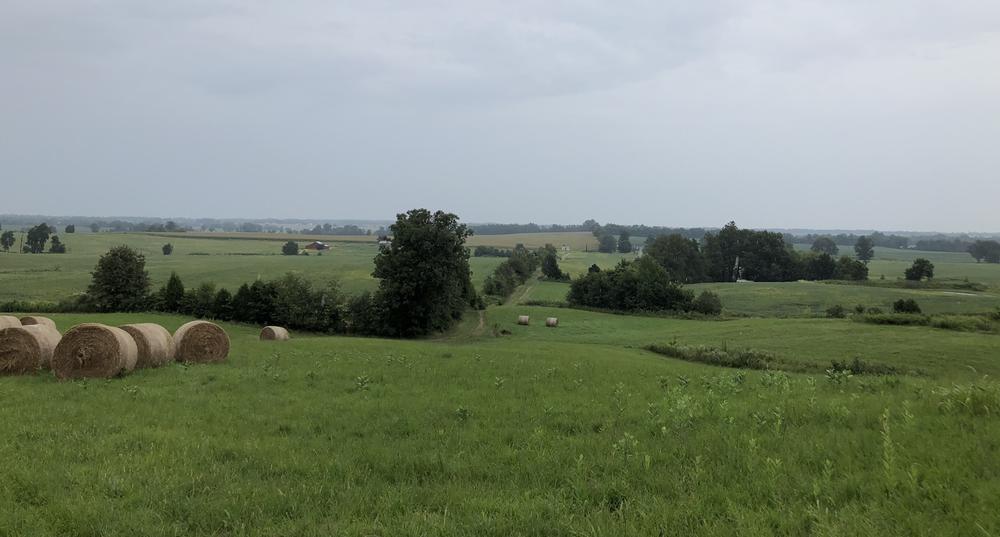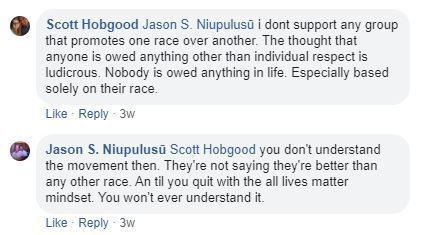Section Branding
Header Content
National Conversation About Race Brews In Rural Western Kentucky
Primary Content
If you spend any time on social media, you know it can be a war of words out there. Whether it's the debate over wearing masks, the racial unrest sweeping across the U.S. or the impending presidential election — everyone's got an opinion and someone is always ready to give a hot take.
But if you're from a small community, it can be hard to hide behind the anonymity of the Internet. Everyone knows everyone. It's likely that you're fairly connected to the person whose Facebook status you just commented on — maybe you grew up together and remained close with mutual friends, or your parents pass the peace every Sunday at church, or you work with someone in that person's family.
Webster County, Ky., is one of those places. With a population of a little over 13,000, the western Kentucky county is rural, working class, predominantly conservative and mostly white. Generally, race isn't something spoken about openly. I know this because I grew up there.
But as the reckoning over systemic racism envelops the country, some Webster County residents have taken to social media to express their views.
Jason S. Niupulusū, 40, a construction worker, identifies as Samoan American and is part of Webster County's small community of color. Niupulusū posts frequently about his support of the Black Lives Matter movement and is a vocal critic of police brutality. Every day, sometimes many times a day, he posts news stories, thoughts and comments about issues related to systemic racism to his Facebook feed.
Niupulusū's posts attracted the attention of Scott Hobgood. Hobgood, 40, is white and works as a plumber. Niupulusū and Hobgood both grew up in Webster County and were in the same high school graduating class. They've remained acquaintances. Hobgood has pushed back on Niupulusū's Facebook posts, calling into question the motive behind George Floyd's killing, the thought process behind the Black Lives Matter movement and the tearing-down of Confederate monuments.
I'm a Facebook friend with Niupulusū, and a fellow brown person from the county, so the exchanges caught my eye. While people of color from the community do often post on social media when incidents like what happened to Floyd occur, it seemed like this time was different: The conversation has been frequent and sustained.
"I don't support any group that promotes one race over another," Hobgood commented on a post by Niupulusū in late June. "The thought that anyone is owed anything other than individual respect is ludicrous. Nobody is owed anything in life. Especially based solely on their race."
"You don't understand the movement then," Niupulusū replied. "They're not saying they're better than any other race. An til you quit with the all lives matter mindset. You won't ever understand it."
As their Facebook exchanges have unfolded, it has become clear that the reckoning on racial justice taking place in big cities is also happening in smaller, more rural towns and communities like Webster County — a quiet place that prides itself on being friendly, helpful and welcoming.
But what would happen if, instead of escalating tension online, the two actually sat down and tried talking to one another face to face on Zoom? Would a real-life discussion simply rehash territory that so often derails Facebook threads — or would it facilitate civility?
When I asked Niupulusū and Hobgood to come out from behind their keyboards to talk frankly about race and navigating those conversions in a small community on Morning Edition, they agreed. They had hopes for what Hobgood called a "good faith" discussion.
In an interview with NPR's David Greene, they argued over race at first, and predictably, the clash revealed the scope of their vast differences. But then, a disclosure about deeply personal history led to a bit of unexpected common ground.
To hear their conversation, press the audio button above.
Lilly Quiroz produced the broadcast version of this story.
Copyright 2020 NPR. To see more, visit https://www.npr.org.



